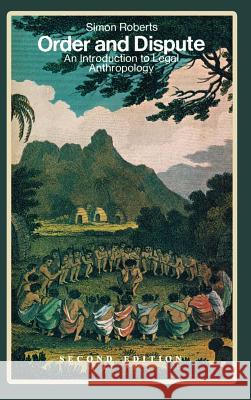Order and Dispute: An Introduction to Legal Anthropology (Second Edition) » książka
Order and Dispute: An Introduction to Legal Anthropology (Second Edition)
ISBN-13: 9781610278454 / Angielski / Twarda / 2015 / 202 str.
Order and Dispute: An Introduction to Legal Anthropology (Second Edition)
ISBN-13: 9781610278454 / Angielski / Twarda / 2015 / 202 str.
(netto: 163,48 VAT: 5%)
Najniższa cena z 30 dni: 167,90
ok. 16-18 dni roboczych.
Darmowa dostawa!
A classic resource in the modern study of the anthropology of law, this acclaimed book is now widely available again in an updated and expanded Second Edition, and in this library-quality hardcover presentation. There are many societies that survive in a remarkably orderly fashion without the help of judges, law courts and policemen. They are small in scale and have relatively simple technologies, lacking those centralized agencies which we associate with legal systems; yet early anthropologists did not hesitate to name "law," along with kinship, politics and religion, as one of the facets of their subject. Simon Roberts contends, however, that legal theory has become too closely identified with our own arrangements in western societies to be of much help in cross-cultural studies of order. But conversely, by looking at the ways in which other societies keep order and solve disputes, he sheds valuable light on the contemporary debates about order in our own society, in a straightforward text which will be accessible to the general reader and anthropologist alike. Now in its Second Edition with a new Foreword and Afterword by the author, this renowned introduction to the anthropology of law is part of the Classics of Law & Society Series from Quid Pro Books. Its modern presentation uses larger font, margins, and dimensions than the original paperback edition, yet adds no more pages."
A classic resource in the modern study of the anthropology of law, this acclaimed book is now widely available again in an updated and expanded Second Edition, and in this library-quality hardcover presentation. • There are many societies that survive in a remarkably orderly fashion without the help of judges, law courts and policemen. They are small in scale and have relatively simple technologies, lacking those centralized agencies which we associate with legal systems; yet early anthropologists did not hesitate to name "law," along with kinship, politics and religion, as one of the facets of their subject. • Simon Roberts contends, however, that legal theory has become too closely identified with our own arrangements in western societies to be of much help in cross-cultural studies of order. But conversely, by looking at the ways in which other societies keep order and solve disputes, he sheds valuable light on the contemporary debates about order in our own society, in a straightforward text which will be accessible to the general reader and anthropologist alike. • Now in its Second Edition with a new Foreword and Afterword by the author, this renowned introduction to the anthropology of law is part of the Classics of Law & Society Series from Quid Pro Books. Its modern presentation uses larger font, margins, and dimensions than the original paperback edition, yet adds no more pages.











